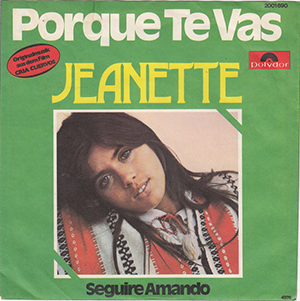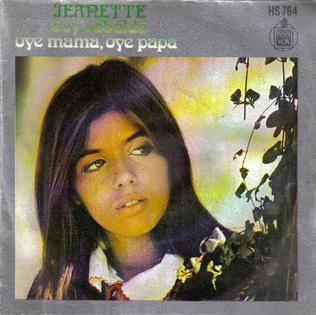Nueva canción is a left-wing social movement and musical genre in Latin America and the Iberian Peninsula, characterized by folk-inspired styles and socially committed lyrics. Nueva canción is widely recognized to have played a profound role in the pro-democracy social upheavals in Portugal, Spain and Latin America during the 1970s and 1980s, and was popular amongst socialist organizations in the region.

María Antonia Abad FernándezMML, known professionally as Sara Montiel, also Sarita Montiel, was a Spanish-Mexican actress and singer. She began her career in the 1940s and became the most internationally popular and highest paid star of Spanish cinema in the 1960s. She appeared in nearly fifty films and recorded around 500 songs in five different languages.

Hendaye is a commune in the Pyrénées-Atlantiques department and Nouvelle-Aquitaine region of southwestern France. Hendaia (endai-a) apparently means ‘the baker’s peel ’.

María de los Ángeles Felisa Santamaría Espinosa, known professionally as Massiel, is a Spanish pop and protest singer. She won the Eurovision Song Contest 1968 with the song "La, la, la", being the first performer from Spain to ever win the contest.

Osvaldo Nicolás Ferraro Gutiérrez better known as Waldo de los Ríos was an Argentine composer, conductor and arranger.
Yé-yé or yeyé was a style of pop music that emerged in Western and Southern Europe in the early 1960s. The French term yé-yé was derived from the English "yeah! yeah!", popularized by British beat music bands such as the Beatles. The style expanded worldwide as the result of the success of figures such as French singer-songwriters Sylvie Vartan, Serge Gainsbourg and Françoise Hardy. Yé-yé was a particular form of counterculture that derived most of its inspiration from British and American rock and roll. Additional stylistic elements of yé-yé song composition include baroque, exotica, pop, jazz and the French chanson.
KBUE is a commercial radio station licensed to Long Beach, California, that serves the Los Angeles metropolitan area. It is owned by Estrella Media and airs a Regional Mexican radio format. Studios and offices are on Hollywood Boulevard in Los Angeles.

Janette Anne Dimech, known professionally as Jeanette, is an English-born Spanish singer and songwriter. She first rose to prominence as the lead singer of Pic-Nic, a teenage folk-pop band that found success in 1968 with her song "Cállate, niña". Jeanette returned as a solo artist in 1971 with the Hispavox single "Soy rebelde", which redefined her career as a romantic balladist and was a hit across the Spanish-speaking world, becoming a generational anthem.

"Porque te vas" is a song by English-born Spanish singer Jeanette, written by José Luis Perales and produced by Rafael Trabucchelli for record label Hispavox in 1974.

The Sandpipers were an American easy listening trio who carved a niche in 1960s folk rock with their vocals and innovative arrangements of international ballads and pop standards. They are best remembered for their cover version of "Guantanamera", which became a transatlantic top 10 hit in 1966, and their top 20 hit "Come Saturday Morning" from the soundtrack of the film The Sterile Cuckoo in 1970.
"Granada" is a song written in 1932 by Mexican composer Agustín Lara. The song is about the Spanish city of Granada and has become a standard in music repertoire.

María Isabel Llaudes Santiago, better known by her stage name Karina, is a Spanish singer and actress who had her biggest success from the late 1960s until the mid-1970s in Spain and Latin America. She represented Spain at the 1971 Eurovision Song Contest with the song "En un mundo nuevo", where she placed second.

Santiago Auserón, also known as Juan Perro is a Spanish singer and lyricist. He was songwriter and vocalist of Spanish rock's Radio Futura. Auserón has been recognized with the Aragón Music Prize for Career Trajectory in 2017, Cubadisco Prize for the Best International Album in 2017 and Aragón Music Prize for the Best Soloist 2019.

Les Surfs were a Yé-yé-style pop group from Madagascar, that existed from 1963 until 1971.

"Soy rebelde" is a Spanish pop ballad written by Manuel Alejandro and Ana Magdalena. It was released by British-born singer Jeanette in 1971, and was her debut solo single. It has been re-recorded by Jeanette in English, French, and Japanese, and has inspired cover versions in diverse genres from flamenco to punk rock and rap.

M Radio is a radio station, based at Lyon (France) and created in 1981. M is dedicated to only French songs like its local competitor in Île-de-France, Chante France.
Los Romeos were a Spanish pop-punk group formed in Castellón in 1988 by the vocalist Patrizia Escoin and ex-members of the group Morcillo el Bellaco y Los Rítmicos.

Mari Cruz Soriano Roales is a Spanish entrepreneur, journalist, pianist, and radio and television presenter.
Hispavox S.A. was a major Spanish record company founded on June 27, 1953, that ran independently until 1985 when it was acquired by EMI. Their studios were located in Madrid, and were known among fans as Sonido Torrelaguna. EMI owned the Hispavox record label, manufactured for other labels and distributed in Spain foreign labels. The Hispavox name is retained by Warner Music Group after its acquisition of Parlophone Music Spain in 2013.

Pic-Nic was a Spanish teenage folk-pop and sunshine pop band formed in Barcelona in the mid-to-late 1960s, composed of lead singer Jeanette, guitarists Toti Soler and Al Cárdenas, drummer Jordi Barangé and bassist Isidoro "Doro" de Mentaberry. Although keyboardist Jordi Sabatés is often mentioned as a member of the band, he does not appear on any of the group's releases, having joined after their only published recording sessions had taken place. Pic-Nic was the successor to the short-lived group Brenner's Folk, originally founded by German-Venezuelan brothers Haakon and Vytas Brenner together with Soler, Barangé and Jeanette, an English girl who had recently moved to Spain after being raised in the United States. After releasing a four-song extended play for the label Edigsa in 1966, the Brenner brothers left the band, being replaced by Cárdenas and de Mentaberry.













